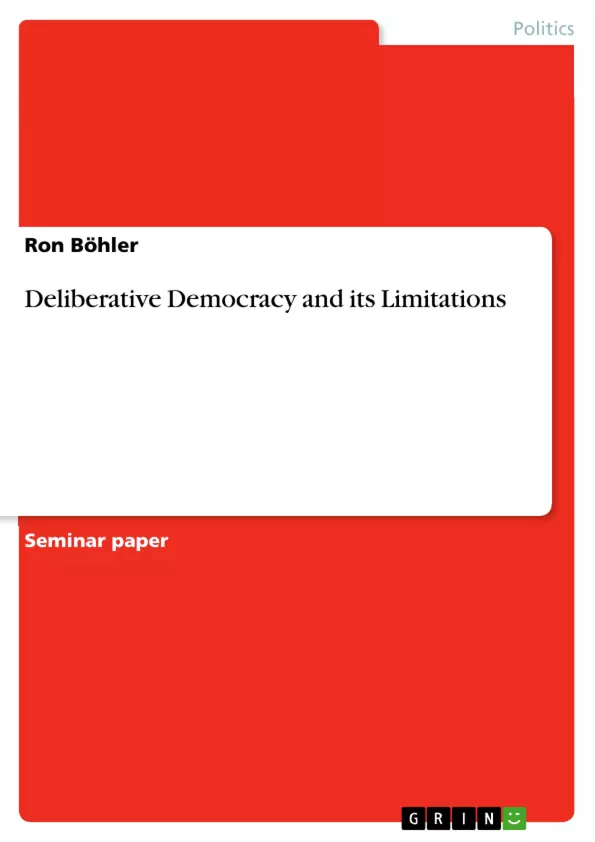This essay examines deliberative democracy in recent theories and its limitations in reality. It starts by defining the term deliberative democracy along its own normative standards. Furthermore, the societal and political context in which deliberation as a form of governance by the people arose will be broached. The second section then addresses major shortcomings of deliberative thoughts, both theoretically and empirically.
There is a huge difference between normative aspirations of deliberation theory on the one hand, and empirical evidence on the other. A prerequisite and similarity among all deliberative forms nevertheless is the existence of a lively public sphere, which guarantees communicative acting as well as the free exchange of information and opinions.
The emergence and rise of deliberation brought forth both sympathizers and sceptics. While its proponents regarded deliberation as a solution to de-politicizing societies and people´s disenchantment with politics, the latter ones remained pessimistic about the adaptability of the concept in practice.
In theory, it seemed to be beyond question that deliberation would do better in terms of citizens´ participation, legitimacy and accountability of the political outcome than its representative counterparts in Western societies. The idea was to give back an active role to the public in the process of policy-making, and as such it was a radical approach.
Inhaltsverzeichnis (Table of Contents)
- INTRODUCTION
- DELIBERATIVE DEMOCRACY: CONTEXT & CONCEPT
- LIMITATIONS OF DELIBERATION
- INCLUSION AND EXCLUSION
Zielsetzung und Themenschwerpunkte (Objectives and Key Themes)
This essay explores the concept of deliberative democracy and its limitations, evaluating its potential for democratic reform. It examines the theoretical underpinnings of deliberative democracy, its historical development, and its practical application. The essay also delves into the challenges and shortcomings of deliberative processes, focusing on their ability to achieve inclusivity and fairness.
- Defining deliberative democracy and its normative standards
- Analyzing the societal and political context in which deliberative democracy emerged
- Examining the theoretical and empirical limitations of deliberative processes
- Assessing the issue of inclusion and exclusion in deliberative democracy
- Investigating the role of public sphere in deliberative processes
Zusammenfassung der Kapitel (Chapter Summaries)
- INTRODUCTION: This chapter introduces the concept of deliberative democracy and its significance in addressing democratic crises. It highlights the emergence of both supporters and critics of deliberation, outlining the theoretical potential and practical challenges of this approach.
- DELIBERATIVE DEMOCRACY: CONTEXT & CONCEPT: This chapter defines deliberative democracy and explores its historical development. It discusses different generations of deliberative thinking, highlighting key figures and their contributions to the evolving concept. The chapter also outlines the theoretical foundations of deliberative democracy, emphasizing its normative standards and its emphasis on consensus-building.
- LIMITATIONS OF DELIBERATION: This chapter delves into the limitations of deliberative democracy, examining how these shortcomings challenge its own normative ideals. It discusses the complexities of contemporary democracies and the difficulty of implementing deliberative procedures in real-world settings.
- INCLUSION AND EXCLUSION: This chapter explores the issue of inclusion and exclusion in deliberative processes. It examines the potential for biases and inequalities to arise, questioning the ability of deliberation to truly represent all voices. The chapter analyzes the role of power dynamics, social inequalities, and individual capabilities in shaping participation and representation within deliberative frameworks.
Schlüsselwörter (Keywords)
Deliberative democracy, democratic crisis, public sphere, consensus, inclusion, exclusion, participation, power, representation, theoretical limitations, empirical evidence, communicative action, rationality, consensus-building, social inequalities.
Frequently Asked Questions
What is the definition of deliberative democracy?
Deliberative democracy is a form of governance where political decisions are reached through open discussion and reasoned debate among citizens, rather than just through voting or interest aggregation.
What are the normative standards of deliberation?
Normative standards include inclusivity, equality of participation, the free exchange of information, and the requirement that outcomes are based on the force of the better argument.
What are the main limitations of deliberative democracy in practice?
Limitations include the difficulty of scaling deliberation to large populations, the influence of existing power dynamics, and the gap between theoretical ideals and empirical reality.
How does the issue of inclusion and exclusion affect deliberation?
Social inequalities and differences in individual capabilities can lead to certain groups being excluded or marginalized within the deliberative process, undermining its fairness.
What is the role of the public sphere in this concept?
A lively public sphere is essential as it guarantees communicative action and provides a space for citizens to freely exchange opinions and information.
- Citar trabajo
- Ron Böhler (Autor), 2010, Deliberative Democracy and its Limitations, Múnich, GRIN Verlag, https://www.grin.com/document/376554



